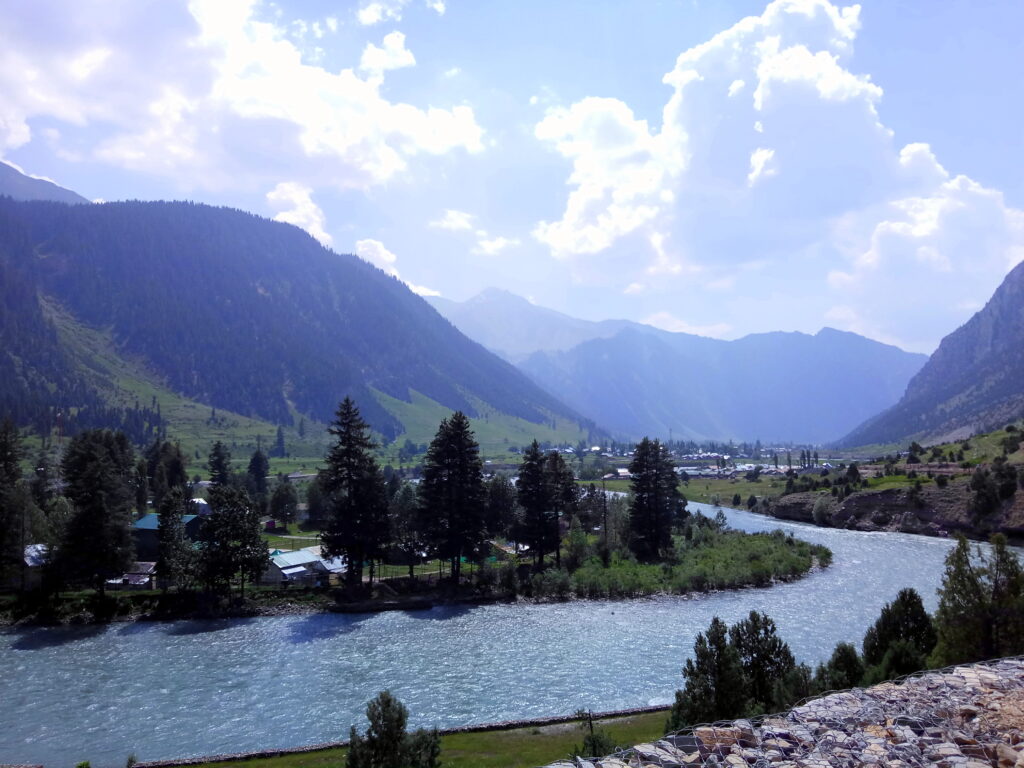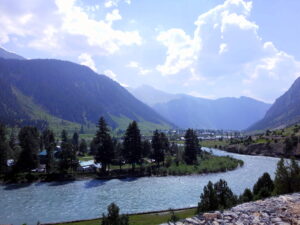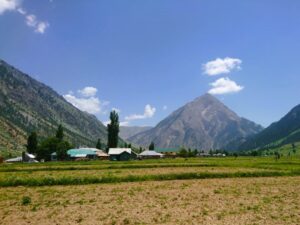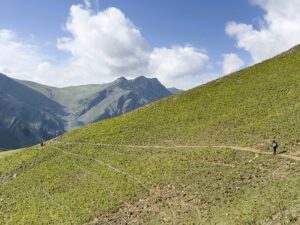- Overview
- Trip Outline
- Trip Includes
- Trip Excludes
- Gallery
- Reviews
- Booking
- FAQ
The Trek
Gurez Valley is an unexplored trail, away from the commercial and crowded treks of Kashmir. It is located in the Dawar (Kashmir), about 141 kms from Srinagar. This trek has all that one would expect from a Kashmir trek, along with something that is getting increasingly rare on Kashmir treks, seclusion! The endless green meadows, pristine blue lakes, the vast expanse of Pine trees, the snow-capped mountains and the gurgling, gushing mountain streams.
Experience this beautiful landscape, coupled with meeting locals and enjoying an enriching cultural experience with them! This trek is a perfect choice for adventure seekers looking for an offbeat, unexplored trek experience.
The Area
Trekking in Kashmir is a unique experience. Not only are the Kashmir treks one of the most beautiful ones you would ever do, the terrain is also very exclusive. The scenes and views you see here are difficult to find anywhere else. The best of campsites are found in Kashmir.
Expected Weather
Mild to moderate showers expected in short spells. Snow on Trail is possible. Temperatures range
from upto 20 degrees Celsius in afternoons to -5 degrees Celsius at night
Day 1: Drive from Srinagar to Dawar (2500 mts).
Distance: 141 kms; Drive time: 6-7 hours
Overnight at homestay / campsite
Day 2: Exploring the Gurez Valley.
Sightseeing around this magnificent valley. A vehicle will be
arranged to show you the splendours of the beautiful valley. Overnight at homestay / campsite
Day 3: Trek from Dawar to Dison (3100 mts). Distance: 5 kms, Trek time: 4-5 hours. Overnight
at campsite
Day 4: Trek from Dison to Khaari (3578 mts) via Dawar heights (3500 mts).
Distance: 5 kms,
Trek time: 4-5 hours. Overnight at campsite
Day 5: Trek from Khaari to Patalwansar I Lake (4019 mts) via Patalwansar II (4001mts)
Distance: 8 kms, Trek time: 6-7 hoursOvernight at campsite
Day 6: Trek from Patalwansar I to Dison (3100 mts).
Distance: 12 kms, Trek time: 7-8 hours
Overnight at campsite
Day 7: Trek from Dison to Dawar (2500 mts).
Distance: 5 kms, Trek time: 3 hours. Drive from
Dawar to Srinagar. Distance: 141 kms; Drive time: 6-7 hours. Trek ends on reaching Srinagar
• Complete stay and accommodation during the entire duration of the trek.
• All meals starting from evening tea onfirst day to breakfast on last day.
• Rentals for all common gear provided to you like tent, sleeping bags, etc.
• Forest Entry Permission, Guide and expertise charges.
• Transport to the Base from Srinagar, Dal Lake, gate no.1 (both ways)
• Cost for sightseeing cab in Gurez Valley.
• Medical First Aid Kit: High altitude first aid kit, stretcher, oxygen cylinder.
• 5% GST
• Meals or drinks purchased by participants during the travel or trek
(example biscuits, fruits, etc.)
• Rentals for personal gear (You’re expected to bring your own personal gear.)
• Flight/Train/Bus ticket till Srinagar.
• Porterage: Participants can carry their own backpacks. Those unable to do so can opt for a porterage service at ₹350 per day
Plan to arrive in Srinagar on Day 1 by 11:00 AM latest. Your pick up will be from Dal Lake, Gate no. 1 at 12 noon on Day 1. Alternately you could arrive in Srinagar the day before and stay a night in Srinagar (at own cost). Plan your return (departure) from Srinagar on Day 8 (accounting for buffer day) after 5 PM in the evening.
Ahdoos hotel (little upscale)
The Gand Mamta near Dal lake (most recommended)
Hotel Ashai Heritage Colonial Bungalow - 3kms from Dal Lake. (No food options. Very spacious and vintage.)
Noor guest house near Dal lake Gate no. 1 (budget hotel)
A certified trek leader, a guide, cook & porters will accompany you during the trek.
In all the camps where the accommodation is in tea houses/ home stays, there will be proper toilets. The toilets are mostly western, in case if they‘re Indian, then we try to provide a toilet seat most of the times.
On the day of camping, we will have toilet tents (with a dry pit toilet), the most hygienic way of answering nature’s call.
A dry pit toilet is an eco-friendly sanitation solution featuring a pit dug into the ground, topped with a toilet seat and a wrought iron stand. Near the toilet, a pile of mud, sand, or coco peat is provided for covering waste after use, facilitating rapid breakdown of fecal matter due to increased microbial activity. This method eliminates the need for water, thereby preventing contamination of nearby water sources, as water toilets are prohibited at campsites.
While toilet paper is available, please use it sparingly to avoid overloading the pit, which can take years to decompose. Please refrain from using wet wipes as they are not bio degradable or use bio-degradable wipes.
You will be sleeping in twos or threes in your tents in sleeping bags. The sleeping bags are snug and comfortable. We will be providing inflatable pillows.
Through the trek, there are no bathing facilities at campsites. Trekkers often take advantage of running streams to freshen themselves up.
We’ve been organizing treks for over five years and have had many female trekkers trek with us. In fact, a lot of them come solo for treks. There has never been a complaint about the atmosphere of a trek, about other trekkers or our professionalism. They have all been kind enough to leave a review.
Tents do not have charging stations. Guests are advised to carry power banks.
1. Good Sturdy Backpack: Prefer a trekking pack over a backpacking one. The size of the backpack depends upon the participant. Normally for a 7-9 day trek a 50-60 litre pack should suffice.
2. Shoes: Any Waterproof trek (not hike) shoe would be ideal.
3. Socks: 3 pair cottons and 3 pairs of woolens.
4. Trek pants (ideally water resistant): Get two quick dry summer trek pants. On summit climb or a major altitude gain day you can replace one dry fit trek pant with shell trekking pants. If you don’t have trek pants you can replace it with gym track pants.
5. T shirt/ base layer: Get 3 T shirts/ trekking base layer on the trek, one of which should be thick and full sleeve. Avoid cotton and prefer dry fit.
6. Fleece/ Sweater/ Good quality Hoodie: Get 1 fleece jacket or sweater. Fleece is preferred over sweater or hoodie as it is lightweight and easy to carry. Sweaters and Jackets can be heavier than fleece for the warmth they offer.
7. Down/ Padded Jacket – Down/ Padded jacket (Upto -5 degrees ). If you don’t want to get a padded/ down jacket, get two fleece. Cotton track pants for camp – These are specifically for cold evenings at the campsite. This can be ignored if you are comfortable wearing your trekking pants in the camp.
8. Thermals : 1 pair. We wear thermals only upon reaching the campsite not while trekking.
9. Windproof Jacket: All rain proof can be used as wind proofs. Required as an additional layer during trekking in windy conditions. Avoid if you have a rain proof jacket.
10. Rainwear: Option A – Rain set – One Waterproof jacket (3000 mm waterproofing), Rain proof pants and Bag cover Option two – Poncho that covers your body and bag completely. We ideally recommend Option 1 as poncho makes trekking difficult.
11. Woolen Cap/ Balaclava: (1) To cover your ears, head and neck. Get one woolen cap and one neck warmer or balaclava.
12. Neck Warmer/ Scarf (1): For evenings. Avoid if you are comfortable using a Balaclava.
13. Gloves: 2 gloves out of which 1 can be water proof and one woolen. The waterproof one has to ideally be padded and a size larger than you normally use. This is so that you can wear both your gloves together if required.
14. Suncap – 1 1
15. Sunglasses – 1
16. Toiletries – Also include sunscreen, moisturizer and lip-cream
17. Headlamp/ Torch -1. Preferably headlamp.
18. Two water bottles (1 litre each) – One can be a thermos flask. One can also get a hydration pack.
19. Camp shoes/ flip flops for camp, plastic covers for inside the backpack to keep your clothes dry
20. Daypack – Required if you have a summit days climb. Preferably one that can be compressed.
21. Documents: 2 passport sized photograph, Address and Photo proof (Driving License or Aadhaar card), Doctor’s medical certificate saying that you are fit for the trek. We reserve the right to not take you on the trek if you fail to produce this.
22. Trekking pole
Meals will be provided by us. However you may carry snack items to much on like dry fruits, biscuits, chocolates, protein bars, or nuts.
Yes, you are ideally expected to carry your backpack. But you do have an option of offloading your bags on a mule for an additional cost. The cost will be INR 400/ per day per bag (weight not exceeding 8kg). One is expected to inform us about offloading 1 week prior to the trek.
Yes, provided you prepare well.
4-5 kms slow jog OR 6-7 kms Brisk walking OR 25 kms cycling. Pace is not important, consistency is important (non-stop jogging/running/cycling)
Squats 20 x 3, Lunges 20 x 3, Calf raises 20 x 3
All of the above at least 4 times a week
Climbing stairs 40 floors with backpack (Atleast once a week)
The common perception is that alcohol makes you feel warmer, however it also dehydrates you & dehydration can be fatal while trekking. Hence consumption of alcohol is prohibited. Smoking in camps is not allowed.
If you cancel –
– 60 days before the trip: we can process a complete refund minus minimum processing charges.
– Between 30-45 days before the trip: you will be refunded 50% of the trek fee.
– Within 30 days before trek starts: No refund.
– If your spot is replaced in a full batch: we will process a complete refund after cancelling minute operational charges. (For fixed departures only)












There are no reviews yet.